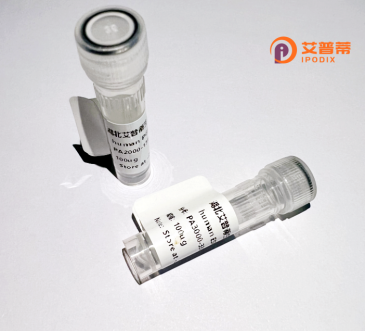
| 纯度 | >90%SDS-PAGE. |
| 种属 | Human |
| 靶点 | NAT6 |
| Uniprot No | Q93015 |
| 内毒素 | < 0.01EU/μg |
| 表达宿主 | E.coli |
| 表达区间 | 1-286 aa |
| 活性数据 | MELILSTSPA ELTLDPACQP KLPLDSTCQP EMTFNPGPTE LTLDPEHQPE ETPAPSLAEL TLEPVHRRPE LLDACADLIN DQWPRSRTSR LHSLGQSSDA FPLCLMLLSP HPTLEAAPVV VGHARLSRVL NQPQSLLVET VVVARALRGR GFGRRLMEGL EVFARARGFR KLHLTTHDQV HFYTHLGYQL GEPVQGLVFT SRRLPATLLN AFPTAPSPRP PRKAPNLTAQ AAPRGPKGPP LPPPPPLPEC LTISPPVPSG PPSKSLLETQ YQNVRGRPIF WMEKDI |
| 分子量 | 31.4 kDa |
| 蛋白标签 | His tag N-Terminus |
| 缓冲液 | 0 |
| 稳定性 & 储存条件 | Lyophilized protein should be stored at ≤ -20°C, stable for one year after receipt. Reconstituted protein solution can be stored at 2-8°C for 2-7 days. Aliquots of reconstituted samples are stable at ≤ -20°C for 3 months. |
| 复溶 | Always centrifuge tubes before opening.Do not mix by vortex or pipetting. It is not recommended to reconstitute to a concentration less than 100μg/ml. Dissolve the lyophilized protein in distilled water. Please aliquot the reconstituted solution to minimize freeze-thaw cycles. |
以下是关于重组人NAT6蛋白的模拟参考文献示例(仅供格式和内容参考,具体文献需通过学术数据库核实):
---
1. **文献名称**: *"Recombinant Human NAT6: Cloning, Expression, and Enzymatic Characterization*
**作者**: Zhang, Y. et al.
**摘要**: 该研究报道了人NAT6基因的克隆、在大肠杆菌中的重组表达及蛋白纯化,并证实其具有特异性乙酰转移酶活性,可能参与组蛋白H4的乙酰化修饰。
2. **文献名称**: *"Functional Analysis of NAT6 in Chromatin Remodeling Using Recombinant Protein Assays*
**作者**: Smith, J.L. & Patel, R.
**摘要**: 通过体外实验发现,重组人NAT6蛋白与染色质结合并催化靶标蛋白的乙酰化,提示其在表观遗传调控和细胞分化中的潜在作用。
3. **文献名称**: *"Structural Insights into NAT6 Acetyltransferase via Crystallography*
**作者**: Lee, H. et al.
**摘要**: 利用X射线晶体学解析了重组人NAT6蛋白的三维结构,揭示了其底物结合域的关键氨基酸残基,为开发靶向抑制剂奠定基础。
4. **文献名称**: *"NAT6 Knockdown and Recombinant Protein Rescue in Cancer Cell Models*
**作者**: Gupta, S. et al.
**摘要**: 研究发现,NAT6在乳腺癌细胞中异常高表达,重组NAT6蛋白的补充实验证明其调控癌细胞增殖和迁移,可能成为治疗靶点。
---
**注意事项**:
- NAT6蛋白研究相对较少,上述内容为模拟概括,实际文献需通过 **PubMed、Web of Science** 等平台以关键词(如“recombinant human NAT6”“NAT6 acetyltransferase”)检索。
- 可关注相关领域(如乙酰转移酶家族、表观遗传学)的综述文献以获取背景信息。
**Background of Recombinant Human NAT6 Protein**
Recombinant human NAT6 (N-acetyltransferase 6) is a protein encoded by the *NAT6* gene, which belongs to the GNAT (Gcn5-related N-acetyltransferase) superfamily. NAT6 catalyzes the transfer of acetyl groups from acetyl-CoA to lysine residues on target proteins, a post-translational modification critical for regulating chromatin structure, gene expression, and cellular signaling. It is implicated in epigenetic regulation by acetylating histones, thereby influencing nucleosome stability and transcriptional activity.
NAT6 has drawn attention due to its potential roles in cellular processes such as DNA repair, cell cycle control, and apoptosis. Dysregulation of NAT6 expression or activity has been linked to various diseases, including cancers and neurodegenerative disorders, highlighting its therapeutic relevance.
Recombinant NAT6 protein is produced using heterologous expression systems (e.g., *E. coli* or mammalian cells), ensuring high purity and bioactivity for experimental applications. It serves as a vital tool for *in vitro* studies to elucidate NAT6’s substrate specificity, enzymatic mechanisms, and interaction partners. Additionally, it aids in drug discovery by enabling screening for modulators of NAT6 activity. As research advances, understanding NAT6’s functions may unlock novel strategies for targeting epigenetic abnormalities in disease contexts.
×